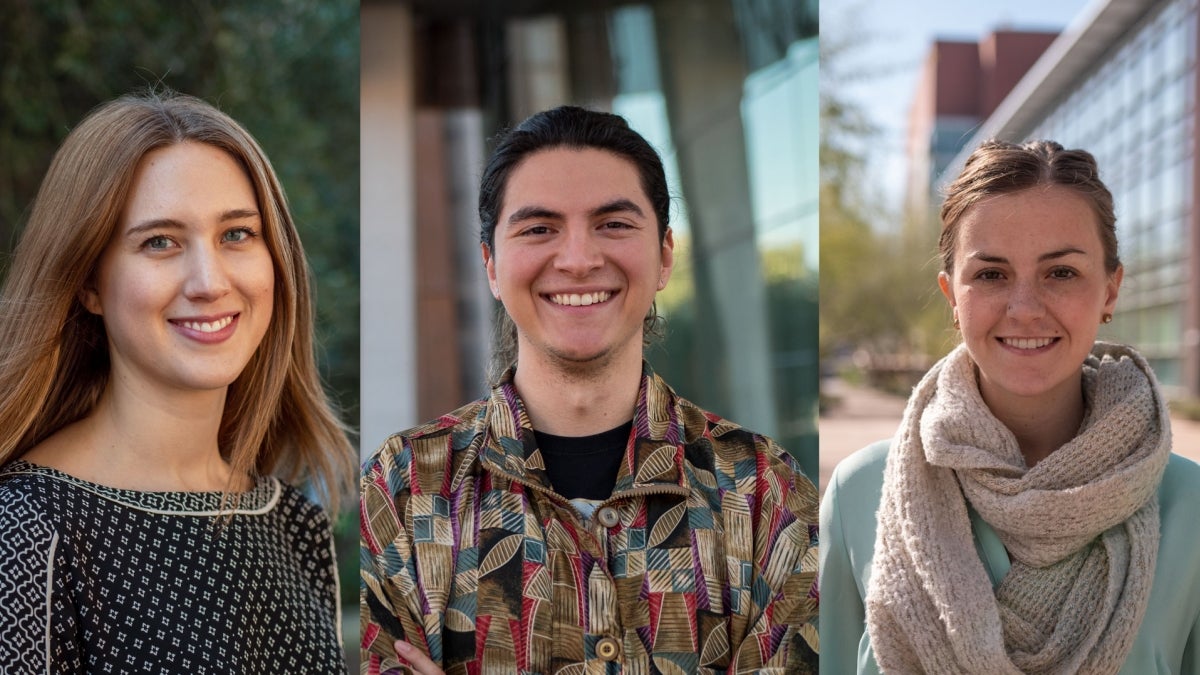ASU alumna creates graduate student fellowship for psychology research on health and addiction

Sarah Oakey, Juan Hernandez, and Laura Winstone are the 2020 recipients of the Sharon Manne Award. Photos: Robert Ewing
A generous gift from Arizona State University alumna Sharon Manne has funded an annual fellowship that will allow three psychology graduate students to pursue their own research projects on health and addiction.
Manne is a professor at the Robert Wood Johnson School of Medicine and is the associate director of cancer prevention and control at the Rutgers Cancer Institute of New Jersey. She created the Sharon Manne Graduate Research Award that will support graduate students training in health psychology, clinical psychology or behavioral neuroscience. Overall, the Sharon Manne Foundation has committed to donating $250,000 to support graduate student research at ASU. The $25,000 annual award funds basic research and applied investigations.
Manne wants to enable students to research important and timely mental and physical health questions that they are interested in without being constrained by funding. Her mentors Alex Zautra and Irwin Sandler instilled in her the importance of giving back, and her award is designed to facilitate the research and professional success of graduate students in the psychology department’s PhD programs.
“Through her generous gift to ASU, Sharon is helping to assure the success and impact of the next generation of health psychologists. Sharon is not only making a donation, but also making a difference by funding promising young scientists whose work has the potential to improve health and well-being,” said Mary Davis, assistant chair and professor of psychology.
2020 Sharon Manne Graduate Research Award Recipients
Sarah Oakey, a fourth-year clinical psychology graduate student, is one of the first three recipients of the Sharon Manne Award. Oakey plans to use the funding to analyze how legalization of recreational marijuana use affects consumption.
“This award allows graduate students to complete their milestones while simultaneously providing the opportunity to lay a strong foundation for their career,” Oakey said. “It is an honor to be selected for this award. I am excited to be given the opportunity to research what I want to research and to pursue new and needed ideas.”
Juan Hernandez is a second-year clinical psychology graduate student in the Las Madres Nuevas project. He was awarded the second Sharon Manne Award to conduct research examining the ways the built environment influences behaviors related to physical health such as nutrition and physical activity. This research can assist in future urban planning efforts and public health interventions, especially among diverse and underrepresented populations.
“I’m interested in neighborhood effects and those effects on pediatric obesity outcomes,” Hernandez said.
The final recipient is Laura Winstone, a fourth-year clinical psychology graduate student. Winstone’s research is on the self-regulatory mechanisms in early and middle childhood.
“This award makes it possible for a graduate student to collect data and research for their own individual research projects,” said Winstone, “and it is all because of the generosity of one of our own alumni.”
More Science and technology

ASU postdoctoral researcher leads initiative to support graduate student mental health
Olivia Davis had firsthand experience with anxiety and OCD before she entered grad school. Then, during the pandemic and as a…

ASU graduate student researching interplay between family dynamics, ADHD
The symptoms of attention deficit hyperactivity disorder (ADHD) — which include daydreaming, making careless mistakes or taking…

Will this antibiotic work? ASU scientists develop rapid bacterial tests
Bacteria multiply at an astonishing rate, sometimes doubling in number in under four minutes. Imagine a doctor faced with a…